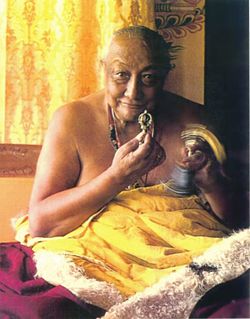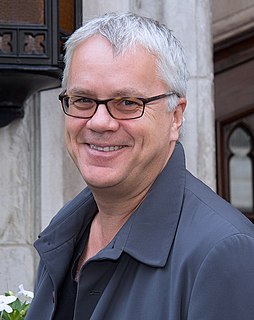A Quote by Eckhart Tolle
Nonresistance, nonjudgment, and nonattachment are the three aspects of true freedom and enlightened living.
Quote Topics
Related Quotes
The story of the Zen Master whose only response was always "Is that so?" shows the good that comes through inner nonresistance to events, that is to say, being at one with what happens. The story of the man whose comment was invariably a laconic "Maybe" illustrates the wisdom of nonjudgment, and the story of the ring points to the fact of impermanence which, when recognized, leads to nonattachment. Nonresistance, nonjudgement, and nonattachment are the three aspects of true freedom and enlightened living.
True nonattachment is understanding that you are fundamentally attached to everything and, through that understanding, dropping your attachment to the view that you are detached from that which you encounter. At the same time, real nonattachment means not clinging to things or people. It means dropping the idea that if you don't have this or if you can't get that, your life will be a catastrophe.
Freemasonry must stand upon the Rock of Truth, religion, political, social, and economic. Nothing is so worthy of its care as freedom in all its aspects. "Free" is the most vital part of Freemasonry. It means freedom of thought and expression, freedom of spiritual and religious ideals, freedom from oppression, freedom from ignorance, superstition, vice and bigotry, freedom to acquire and possess property, to go and come at pleasure, and to rise or fall according to will of ability.
A virtuous man or woman who is determined to develop the Supreme Enlightened Mind, should thus develop it: I have to lead all living beings to put a stop to (reincarnation) and escape (suffering), and when they have been so led, not one of them in fact stops (reincarnating) or escapes suffering. Why? Because, if a Bodhisattva believes in the notion of an ego, a personality, or a living being, he is not a true Bodhisattva.
In the West, there's a myth that freedom means free expression-that to follow all desires wherever they take one is true freedom. In fact, as one serves the mind, one sees that following desires, attractions, and repulsions is not at all freedom, but is a kind of bondage. A mind filled with desires and grasping inevitably entails great suffering. Freedom is not to be gained through the ability to perform certain external actions. True freedom is an inward state of being. Once it is attained, no situation in the world can bind one or limit one's freedom.
My study of Gandhi convinced me that true pacifism is not nonresistance to evil, but nonviolent resistance to evil. Between the two positions, there is a world of difference. Gandhi resisted evil with as much vigor and power as the violent resister, but True pacifism is not unrealistic submission to evil power. It is rather a courageous confrontation of evil by the power of love. . . .
We are resolved to protect individual freedom of belief. This freedom must include the child as well as the parent. The freedom for which we stand is not freedom of belief as we please,... not freedom to evade responsibility, ...but freedom to be honest in speech and action, freedom to respect one's own integrity of thought and feeling, freedom to question, to investigate, to try, to understand life and the universe in which life abounds, freedom to search anywhere and everywhere to find the meaning of Being, freedom to experiment with new ways of living that seem better than the old.

































